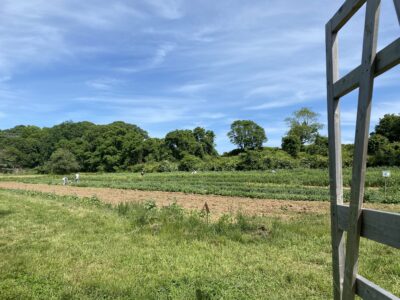Blog
A Note from Layton at Quail Hill Farm | An Extraordinary Year
Harvesting at Quail Hill Farm
By Layton Guenther
2020 was a year of extraordinary growth and transition at Quail Hill Farm. In my first full year as director, I approached the season with renewed commitment to our mission: to grow good food, cultivate community, and train new farmers in the practices of regenerative agriculture.
I was heartened to see the optimism and steadfastness that the members brought to this year, which launched with challenges that could have derailed our operations. And yet, in the face of great uncertainty, the farm community of members and growers rose up with mettle and mirth to envision a season of abundance, possibility, and promise.
As a small farm, our margins are tight in every way; each employee hired, every seed purchased, and every CSA membership determines how our farm fares overall from year to year. When the economic shutdown came to call on our East End towns, Quail Hill, like many farms, experienced a spike in demand from individual consumers seeking alternatives to picked-over grocery store offerings, while also seeing the consequences bear down on our restaurant partners as they shifted their business models. In response to the accelerating pandemic, we instituted a hiring freeze while offering pay-what-you-can farm shares in the early spring. Usually, one speaks of March as coming “in like a lion, out like a lamb,” but this year the reverse was true.
So many of our best-laid plans for 2020 were scuttled: an Americorps invasive species removal project, educational elements of our hallmark apprenticeship program, restaurant-supported agriculture programs with local chefs. On top of this, our beloved farm community events like the breakfast, potluck and At the Common Table were all canceled. Nevertheless, members and farmers found new and meaningful ways to engage with Quail Hill.
New community partnerships were also forged in the economic shutdown that saw local food pantries balloon with new clients facing food insecurity.
In late March, at the urging of two Quail Hill Farm members who wished to investigate how we could make our produce available to families in need, we reached out to the staff at the Bridgehampton Child Care and Recreational Center (The Center) and learned that their food pantry was allocating more food than ever before: over 700 people, weekly, with no consistent supply of fresh vegetables— an increase from 70 people per month pre-COVID.
![block.image[0].title](/assets/images/Volunteers-packing-the-produce-feom-Quail-Hill-Farm.jpg)
Volunteers packing the produce from Quail Hill Farm for The Center.
Farm to Food Pantry
With seed funding from two Quail Hill Farm members, and the leadership of Ms. Bonnie Cannon, The Center’s Executive Director, we designed a pilot Farm to Food Pantry program to allocate excess produce from our farm to our community partners at no cost, thanks to private donations and a grant from All for the East End (AFTEE) at the Long Island Community Foundation. As farmers, the Farm to Food Pantry program has elevated a sense of purpose in our work: apprentices have consistently expressed their passion for the pilot program, which has seen over ten tons of produce harvested and distributed to East End families through The Center’s networks.
In a year that has brought untold challenges to most, the Quail Hill Farm community of farmers, eaters and CSA members have responded with empathy, clarity and courage. Our beloved farm members donated over one thousand hours of their time to assist in the roll-out of COVID safety protocols at the farm as well as helping out in the fields, lifting the spirits (and lightening the workload!) of old and new farmhands alike.
Although 2021 will likely not see a tidy resolution to all of the chaotic renderings of this pandemic, we will face the coming season with the blueprint of how to grow for a resilient future. With both feet firmly planted on our Amagansett silt loam, we’re already eagerly preparing for another season of abundance, community and connection.


